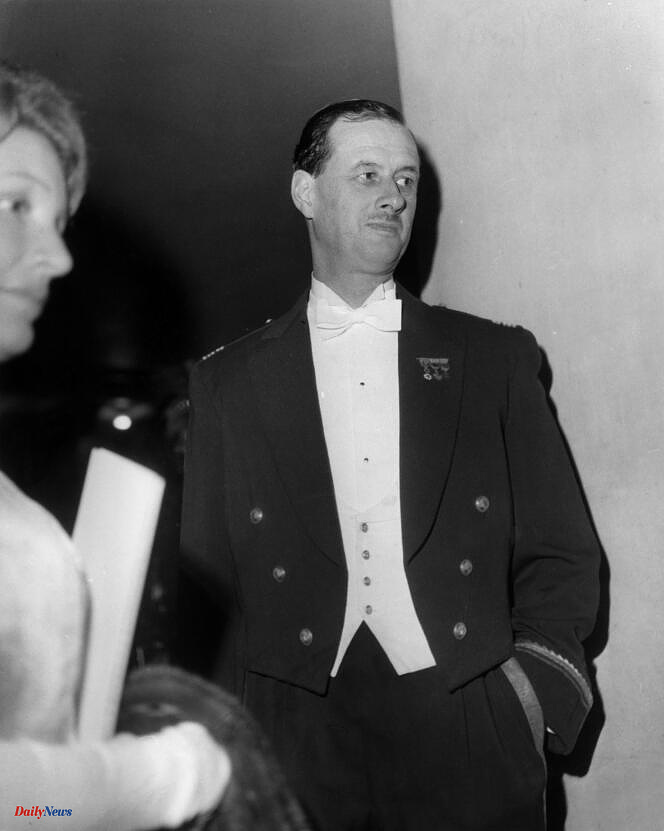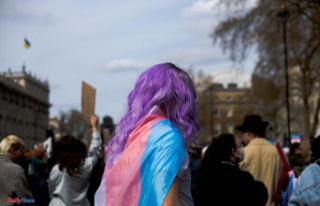Philippe de Gaulle’s luck is to have been the “son of…”. His bad luck is to have been just that. A courageous soldier during the Second World War, he had a successful career in the national navy but the measuring rod with which he was measured inevitably made him smaller. Victim of his glorious ancestry, he took his revenge late in life with a best-seller, De Gaulle my father, a very personal version of the great man, which captivated the general public but angered them with established historians.
Died on the night of March 12 to Tuesday March 13 at the age of 102, Admiral Philippe de Gaulle was born in the capital on December 28, 1921. He is the first child of Yvonne Vendroux and Captain Charles de Gaulle, injured in Verdun in 1916, who was teaching at Saint-Cyr at the time. Contrary to persistent legend, Philippe de Gaulle is not the godson of Philippe Pétain. But he holds Charles de Gaulle in high esteem. As a testimony to their ties, which date back to 1912, the Marshal will dedicate his photo to the newborn with these words: “To young Philippe who will, I hope, follow in the footsteps of his father. »
War Cross, Grand Cross of the Legion of Honor
From the cradle, history awaited Philippe de Gaulle. She entered his life definitively on June 19, 1940 when, accompanied by his mother and his two sisters, he arrived on the English coast in the hope of finding his father, of whom they had lost track. It was by opening the local newspaper that they learned that a French brigadier general named Charles de Gaulle had launched the day before, on the BBC, a call for resistance against the occupier. Philipe de Gaulle is 18 years old. He is a slender young man with a hairless face who had difficulty convincing his father to let him prepare for Navale at Stanislas College in Paris, where he had just passed his baccalaureate. Colonel de Gaulle would have preferred to see him embrace a diplomatic career, under the pretext that it is “hardly advantageous for a family to have too many soldiers in its midst”.
A student at the Free French Forces Naval School, class of 1940, Philippe de Gaulle would wage what we call a great war. He participated in the air defense of Portsmouth then in multiple operations in the Channel and the Atlantic. On August 1, 1944, he landed on Utah beach, in Cotentin, with the men of the Leclerc division, where he was enlisted as a marine rifleman. The 2nd DB rushed to Paris where Ensign Philippe de Gaulle received the order, on the 25th, to negotiate the surrender of the German soldiers entrenched in the Palais-Bourbon, a mission which he carried out with composure, without having fired a shot.
With the Alsace campaign behind him, peace having returned, Philippe de Gaulle became a pilot on an aircraft carrier. He participated in the Indochina and Algerian wars before holding several air or maritime commands, including that of the Atlantic Wing. He ended his military life in 1982 as admiral inspector general of the navy.
Croix de Guerre, Grand Cross of the Legion of Honor, he was not a companion of the Liberation. An “oversight” for which his father had justified himself: “Naturally, I could not, my son, become a companion of the Liberation. Otherwise posthumously or if you had come back seriously mutilated, and again! » Before adding in the same tone: “Anyway, everyone knows that you were my first companion. »
To be the son of such a father
Philippe de Gaulle was annoyed at being considered a “son of an archbishop”, as someone who owes his career to his father’s position. In the little game of backbiting he inherited, for obscure reasons, the nickname of Sosthenes and suffered for a long time from the jealousies aroused by an extraordinary destiny which was not his own.
He felt he was being bullied. A close friend of the General, Jacques Foccart, recounted a visit that Philippe de Gaulle had made to him, the day after the death of his father, to complain about being only a ship captain: "To convince me, he cites the examples of Stalin's son, who was promoted to general at age 27, and Eisenhower's son, who is also a general. » Jacques Foccart opens up about this visit to Georges Pompidou, whose collaborator he is in the presidency of the Republic, and is told: "I don't take him for an eagle and he is often clumsy, but he is the son of the General. We have to do something for him. »
This is how Philippe de Gaulle became rear admiral in September 1971. And in retribution for the same debt, Jacques Chirac later made him senator of Paris, a seat that Philippe de Gaulle occupied under the RPR then UMP label from 1986 to 2004.
The joys and misfortunes of being the son of such a father. An intimidating and inflexible father, even in family privacy. A father attentive to the education of his children but distant, not very present, focused on his destiny and that of France. From an early age, Philippe de Gaulle understood that he would never share the great man's familiarity. “After kissing me, which he rarely does, he sends me away after a quarter of an hour…” How many times did he have to be content with this measured affection, despite the forms that his father put into it? calling him “dear old boy”?
Heir to the moral rights attached to the work of the General
He is the eldest but he is not the favorite. Charles de Gaulle's tenderness went first to his daughter Anne, who had Down's syndrome, who died at the age of 20 in 1948. And in the narrow family circle, Philippe de Gaulle had to reckon with Alain de Boissieu, his sister's husband. Elizabeth. He is a companion of the Liberation. He will be Chief of Staff of the Army and Grand Chancellor of the Legion of Honor.
When his father died in 1970, Philippe de Gaulle inherited La Boisserie in Colombey-les-Deux-Eglises (Haute-Marne). Above all, he inherits the moral rights attached to the work of the General, his memory, his image, his writings and his archives. He took advantage of his newfound freedom to make public a curious letter that his father sent to him in 1964, in which he expressed the hope of seeing him in turn assume, when the time comes, “the responsibility of leading France ".
In homage to the deceased, thousands of streets and schools were named “Charles-de-Gaulle” after his death. Even in 1990, it was almost every day that Philippe de Gaulle was invited to honor with his presence the inauguration of a college, a ceremony or a conference. He is all the more in demand as, as the years go by, his resemblance to the General has become striking. Same gothic stature, same “Cyranoesque” nose – an expression of his father –, same hint of mustache and drooping eyelids.
Memories gone unnoticed
He who had long opposed any figurative representation of the General made an exception for the statue which is erected at the bottom of the Champs-Elysées, not far from those of Churchill and Clemenceau. He publishes numerous works. First the thirteen volumes of his father's Letters, notes and notebooks (all from Plon like the other books by Philippe de Gaulle). Then an album of photos taken from the family archives, De Gaulle (1989). Finally, his own memories, under a title in the form of an observation: Memoirs accessories (two volumes, 1997 and 2000).
These Memoirs go almost unnoticed. However, they are full of information and unpublished anecdotes, which will serve as a framework for De Gaulle my father (two volumes, 2003 and 2004). But the style is starched. And the details they abound on the career of Philippe de Gaulle are rather monotonous. Alone at his writing desk, he has no manners.
His interviews with Michel Tauriac for De Gaulle my father met with immense success. It sold, according to its publishers, eight hundred thousand copies in total plus eighty thousand in paperback (Pocket). At the same time, in 2006, again with Michel Tauriac, he published a new photo album, My father in images (Michel Lafont).
With De Gaulle my father, Philippe de Gaulle achieved, satisfied, notoriety. At over 80 years old, he visits the radio and television studios, chats with Arielle Dombasle, is roomed by Thierry Ardisson and cajoled by Michel Drucker. He does so much cartwheels, he looks so much like his father that the General's loyalists cry treason.
De Gaulle my father lifts the veil on a hidden part of the life of the founder of the Fifth Republic – the husband, the father, the grandfather. The private man gains in details – we knew almost nothing about it. Philippe de Gaulle depicts the General one day throwing Le Monde in his wastebasket in contempt. He reveals that his father “loved big sauerkraut.” And that he made his grandchildren, whom he cherished, laugh with this riddle: “What color are the peas? Little goldfish! »
Readers of De Gaulle my father appreciate it. Historians turn their noses. The work is full of factual errors, misinterpretations and pettiness. To refute the accusation of anti-Semitism sometimes made against his father, Philippe de Gaulle explains that “many of [he]’s doctors were Jewish” and names them one by one. He attacks the memory of Blum and Mendès France and even those of Mauriac and Malraux. As the historian Pierre Nora cruelly put it, with this best-seller, “the Admiral marshaled the General”.
Then the quarrel subsided. In the evening of his life, Philippe de Gaulle was more sparing with his appearances, even if he honored with his presence the tributes that the Republic paid to the great man, to this very different father.












